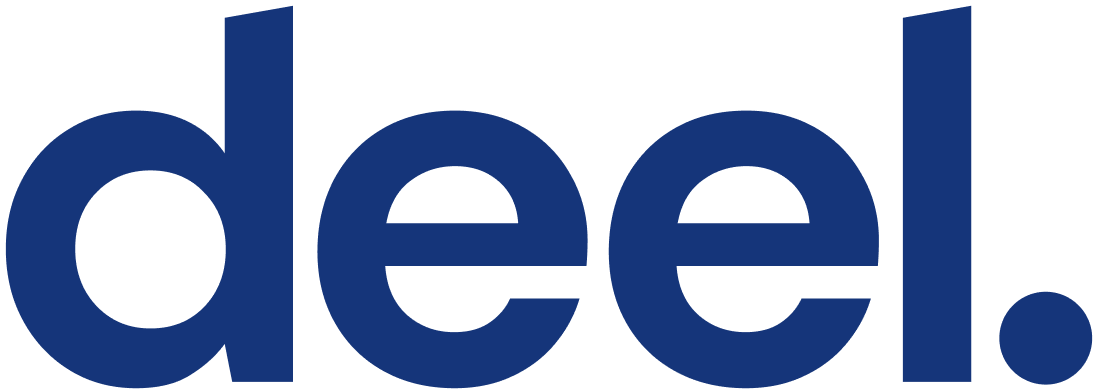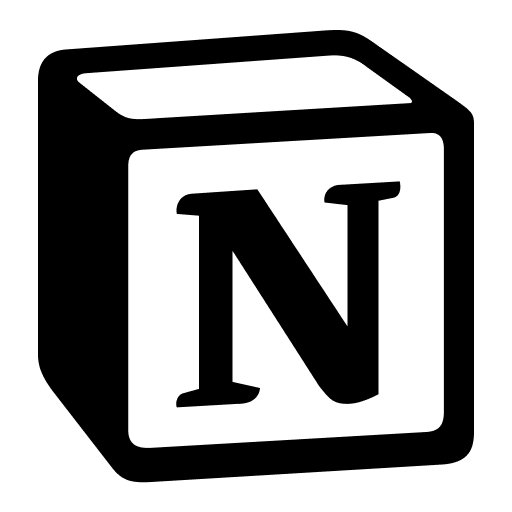Candidate Experience | Metrics, Processes, And Anecdotes To Go From Good To Great
10 minute read
I got into Recruitment because of candidate experience.
2007 – It was my first real job: HR data entry, crunching spreadsheets for the HR manager. At the time I heard a couple of engineering interviews. I’d done some coding and had dabbled in computer science enough to tell that they were asking them the wrong questions. So I offered to help them out with their next engineering interview. And just like that I was in technical recruiting.
I didn't know it back then, but I came to realize that many companies were really struggling with this exact problem. Enough that I was able to build my own brand around helping founders build their engineering teams.
If I could print something on every door of every office, it would be, “Even if we don't want to work with them, they should want to work with us.” That’s the core of candidate experience, and you can create that feeling.
A Great Experience Is One Where A Rejected Candidate Still Recommends Your Company To Others
The more I've progressed in my career, the more teams I led, the more elements of recruitment I became responsible for, the more I care about the overall experience of that pipeline. My own experience showed me that how you’re treated as an applicant is often a very good impression of how you’ll be treated as a team member, which has led me to relentlessly prioritize experience.
It’s so easy to fall into the trap of prioritizing the people you know you can hire, and letting everyone else drop. But that’s only a short-term win. Someone who isn’t a fit for one role might be a great fit for another. If you’ve made them feel unimportant or overlooked, they won’t want to come back, they will call you out (sometimes on LinkedIn and Glassdoor), and it’s very unlikely they will ever buy your product.
A good candidate experience is one where a candidate feels seen and heard. A great candidate experience is one where a rejected candidate still recommends your company to others.
Speed, attention, and preparation are the best places to improve an experience
Non-recruiters have a misconception that recruitment doesn’t take time. But it’s one of the most time-consuming tasks because it involves people. Potential recruits aren’t computers that sit in a room waiting for your input. They’re people with lives and feelings. So to achieve a great candidate experience, you have to first abandon that misconception and embrace the fact that it’s going to take time.
Start with a well-prepared team
Candidates in a newly-opened job too often have poor experiences.
I’d estimate that 80% of jobs aren’t initially specified well, and early candidates end up being unofficial test subjects to help recruiters and hiring managers refine the role. Even if an applicant is excellent, it doesn’t matter if the hiring manager doesn’t know what they want.
Even if it’s an urgent hire, decide what you’re looking for before you start sourcing, so by the time you start filtering people into the pipeline you’re not rushing to build it out in front of them. I recommend you require upfront:
- What will the person be expected to do in the role?
- A rubric for what qualities/experience they will need and examples of what ‘great’ and ‘poor’ look like.
- An interview plan with questions for the interviewers.
- If there is an assignment, an outline of the assignment and how it will be assessed.
Identify and celebrate hiring managers that focus on candidate experience
You need to find the champions that can help you adopt a certain approach - putting candidates at the center - and make sure others look to them to set the culture around hiring. Once you've got that, once talent acquisition and recruitment starts living within the organization, that's when you will start to feel the impact of more formal training.
One way I have seen this done in previous roles was that becoming an interviewer was something you needed to earn. If you were interviewing for the engineering team, it meant you were senior on the team, you had training, you’d done reverse shadowing, and you’d graduated to actually being in front of candidates. It made it something people opted into and truly wanted to do instead of feeling like a chore.
Ensure hiring managers and interviewers have training
Too many companies think hiring managers will know how to do their job from day one. That’s just not possible. Recruiting takes an entirely different mindset. It’s not fair to expect someone who isn’t familiar with it to take it on naturally. So training for hiring managers and interviewers is crucial. To do this we recommend starting with basic values training, clear expectations of what a candidate will need to be successful, and then track candidate survey results and pass through rates by interviewer to ensure there are no anomalies.
Ensure hiring managers know who is sourced and who came inbound
Another prepwork fail point is when hiring managers or interviews don't know who has been sourced and who wasn’t. This is always a recipe for bad candidate experience. If the candidate was sourced, they’re already likely to be a good fit - you need to sell them on the company. You want to wait to start interviewing them until they're sufficiently pitched and excited about your company. But interviewers have to know who’s who in order to do that.
Give candidates all the details before they apply
People want to know how much time they need to invest in the process (especially sourced candidates), so I always put the interview plan up front if possible. It’s a hot topic, but sharing compensation upfront also saves so much time (and is now legally required in a lot of markets too). Waiting until the final stage to discuss compensation is a big waste of time. That kind of clarity helps a lot with the candidate experience; people know what they're signing up for.
Set candidates up for interview success
What I see going wrong all the time is a failure to set people up for success.
In way too many interviews, the interviewee doesn't know what the interviewers are looking for. It’s a black box, the interviewee can’t prepare. So just tell them. Say:
- This is who you're meeting with
- This is what they do
- This is what they care about on this call
On the candidate's side it’s really detrimental for their experience when they don't know what they need to do to do well. But it’s detrimental to the interviewers, too. It’s so much easier when interviewers are prepared on what to look for, when they know what their goals are. I’ve seen whole interviews where there's no preparation from either side, or every interview at the same stage was different. It’s a horrible experience and it’s completely avoidable.
Most companies that are taking hiring seriously, the first thing that they start implementing is structured interviewing (these help.) They build interview feedback systems, or instructions that every person gets. It’s so important to standardize this part of the process.
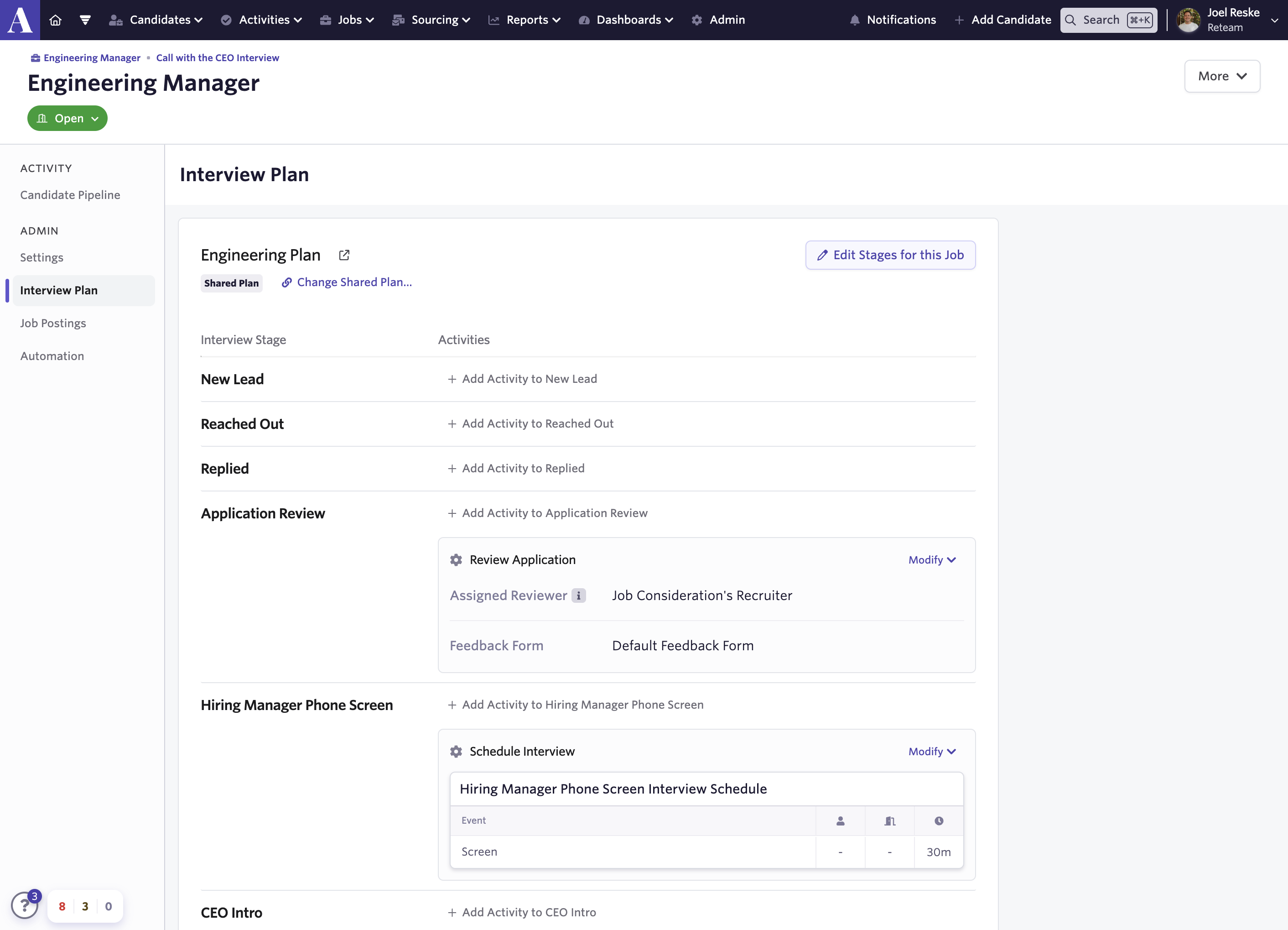
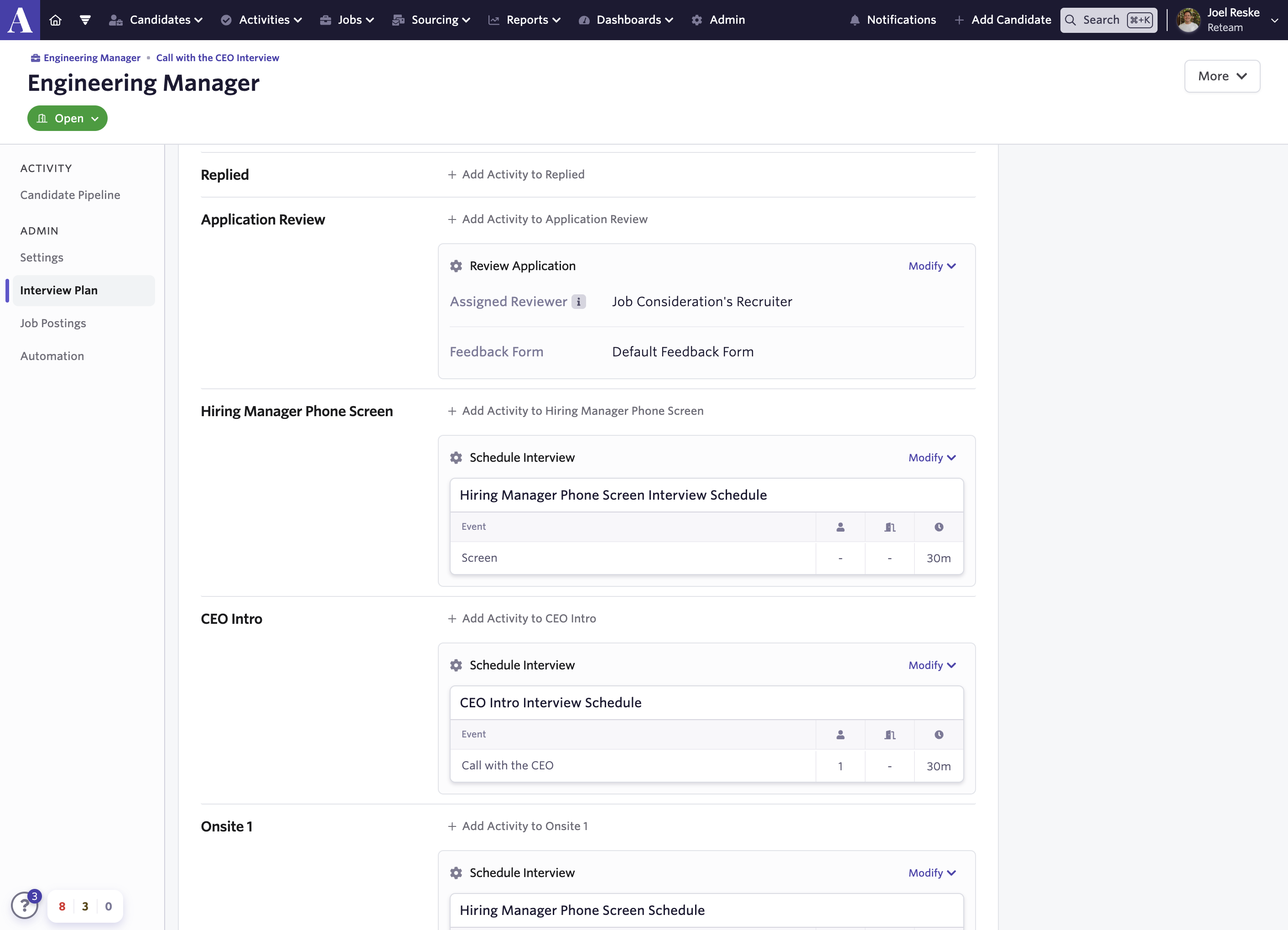
Offer assessment options that create space for different circumstances
Assessments become a bad experience when they don’t match your work style.
At Ashby, we give engineering candidates the option to do either a take home or an in-person live coding assessment. Different people work better in different ways, and this choice lets engineers play to their strengths and show us their best work.
It makes an impact just having the option and making the hiring process feel like a two-way street.
Too many companies still think that talent is a commodity, or that an eight hour long assessment is normal. And it could be normal, but it depends where you introduce it. For instance, I’m a parent. Before I became a parent, I might have had time to go through an eight hour assessment loop, but right now I can’t do that. It’s an unreasonable friction, and not a predictor of good talent.
At Ashby we do one three hour take home, or you can code live with the team for about an hour and fifteen. People have the option to do what they think is best. Just that one choice, it makes all the difference.
Reach out often, even for rejections
When we talk about what not to do, ghosting is obvious, right? It’s something we all know: always follow up. But unfortunately, in this day and age, getting a rejection, even if it's a canned message, is a good experience. To go a step further than this isn’t hard though.
Automation is one way. In my time as the Head of Talent at VanMoof, we leveraged Ashby’s Alerts for candidates that had been in the pipeline for more than 5 days. This combination let us move candidates along and out of the pipeline with ease. As recruiters, a place a lot of us struggle is in letting people fall through the cracks – it will improve candidate experience if you put a system in place to stop that from happening in the first place.
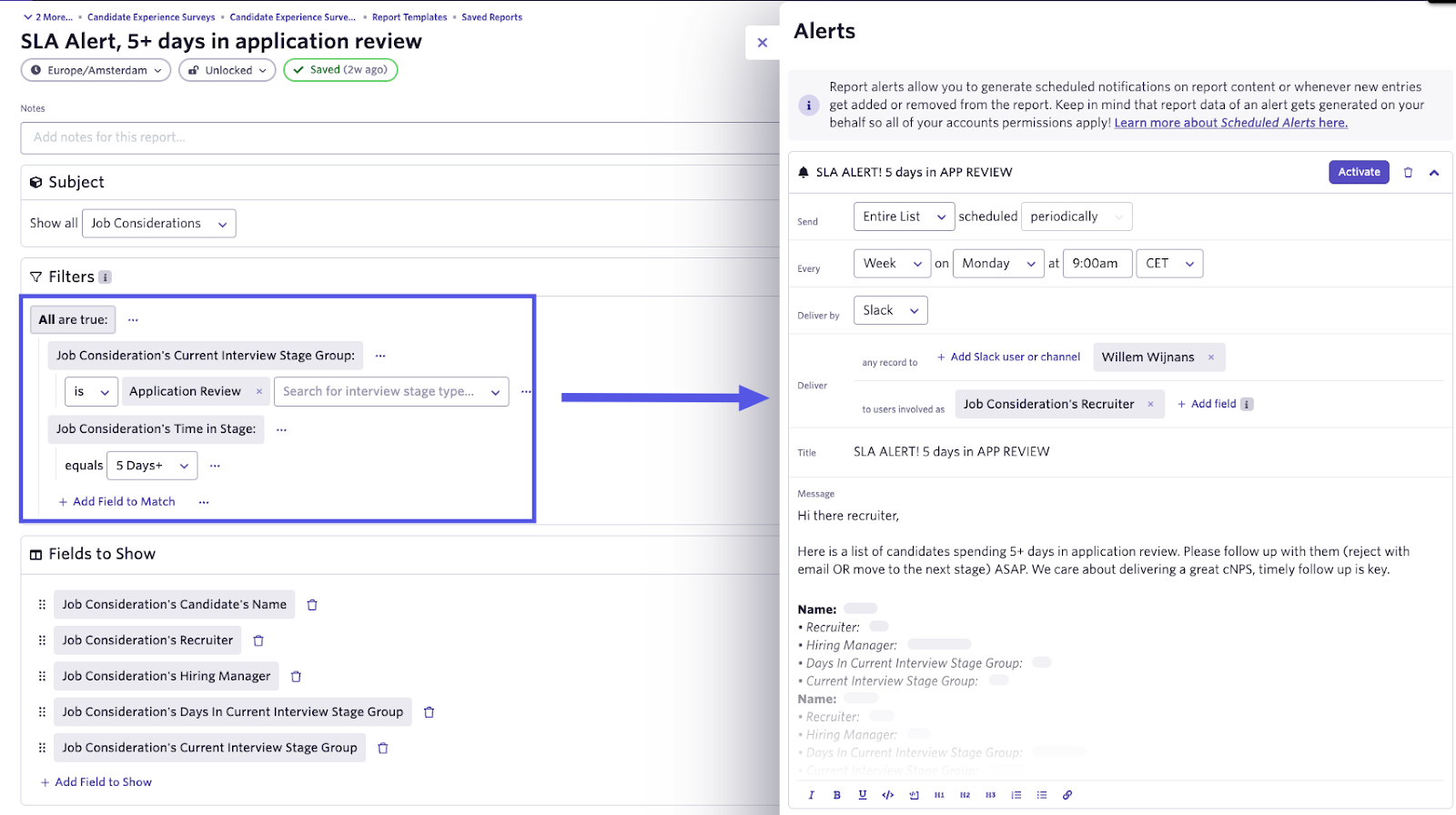
Measure for patterns, not numbers
If you’re serious about measuring candidate experience, you can’t just use a typeform then crunch the numbers yourself. You want to use a dedicated tool that can help you visualize the data.
But you only need to ask two or three questions at the absolute max. Consider these:
- How likely are you to recommend working at this company to someone else?
- I was briefed well on what to expect during each interview (setting candidates up for success is paramount to a good cNPS)
- Open ended question: “Do you have any general feedback for us” (there will be lots to uncover here)
This is an example of the NPS dashboard I built for the team in Ashby:
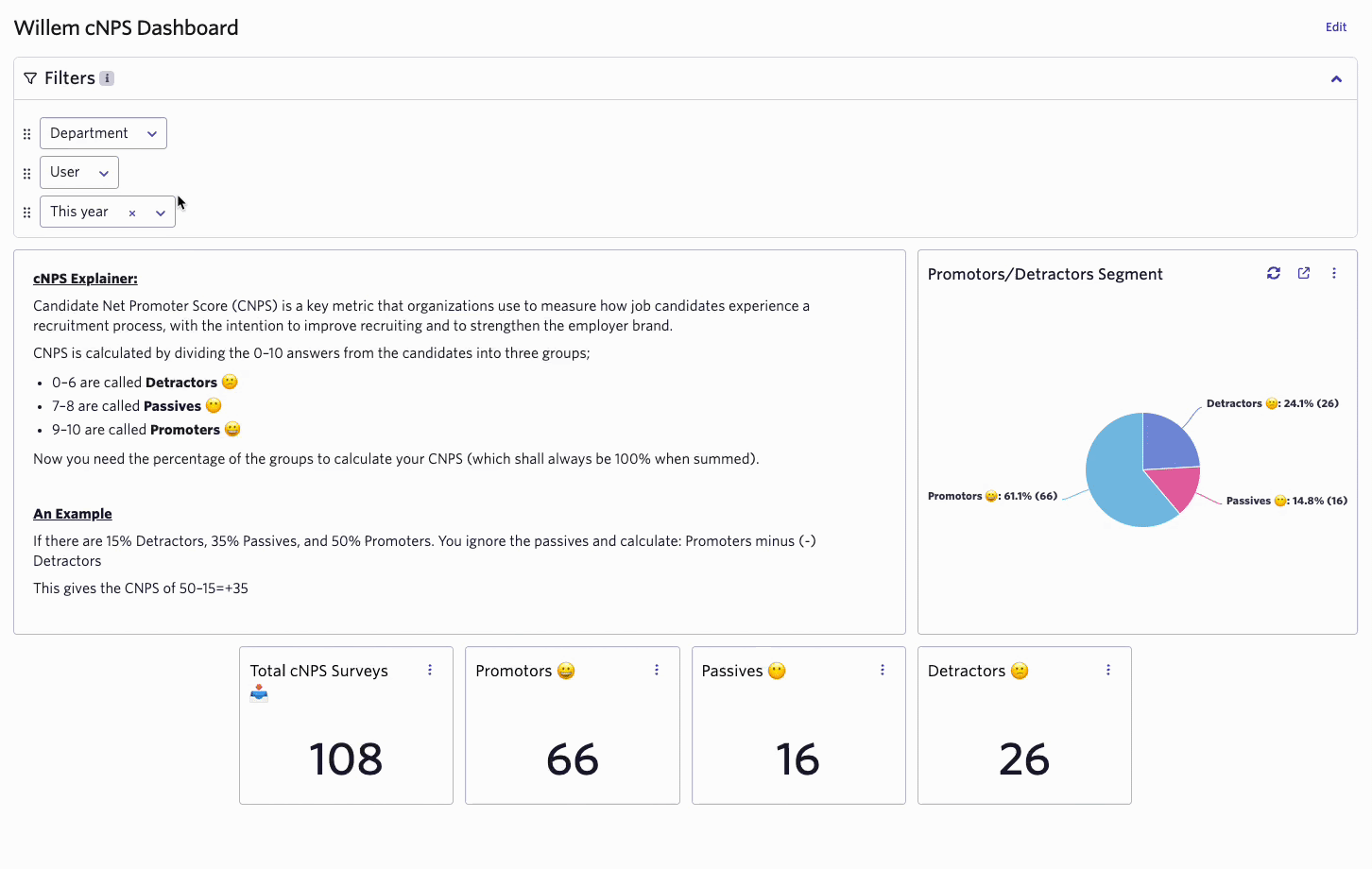
I am particularly proud of having a high cNPS (40) in stage “second round” (left bottom chart). These are all people that fill in our survey when they are rejected for a role:
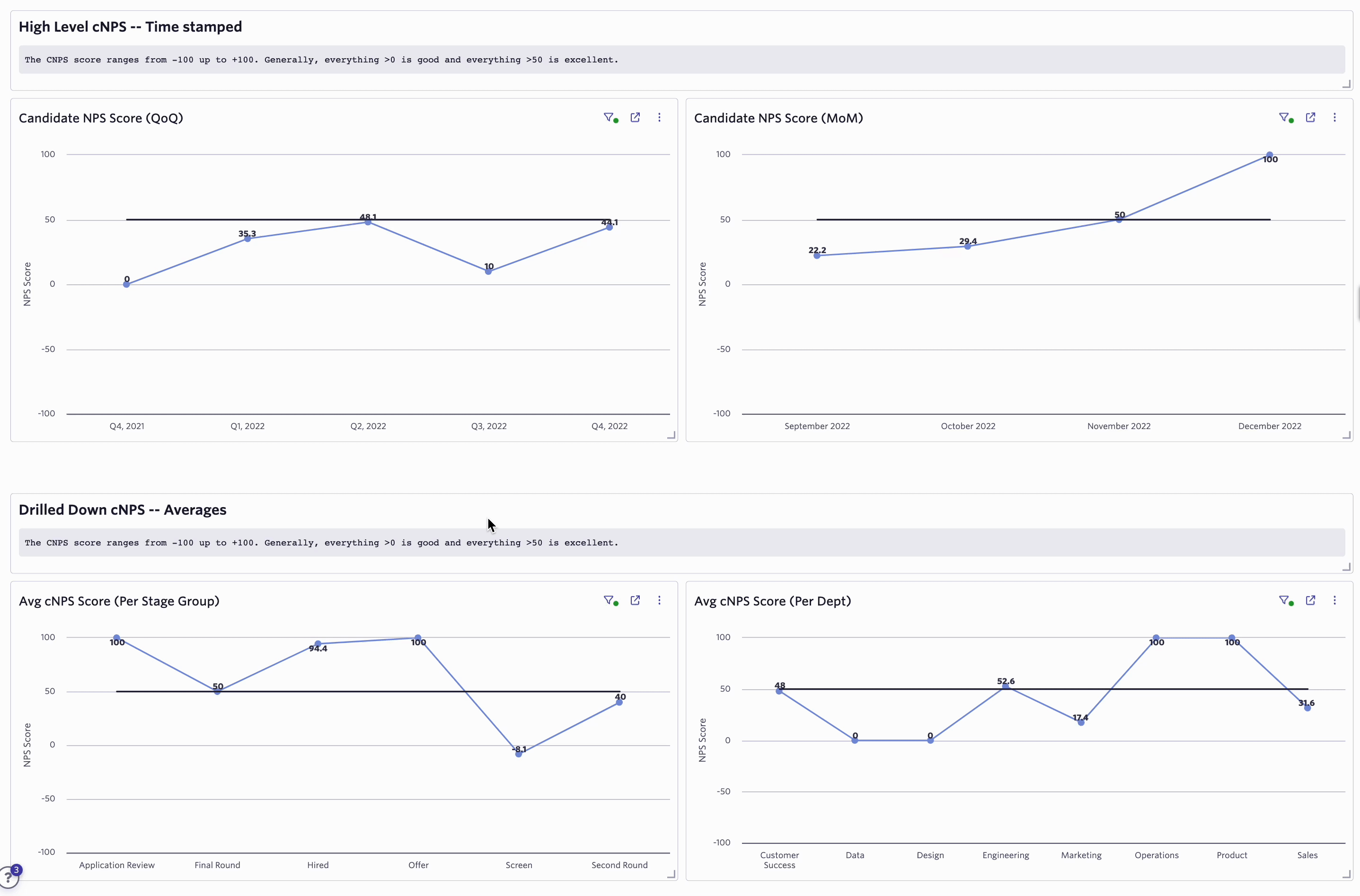
Scan relentlessly for promoters and detractors who get denied in the final stages of your process.
If you find final-stage detractors who should not have been there in the first place, that’s great discussion material for the team on how to optimize in the future. If they detract because they spotted a genuine issue, like bad interview preparation, that’s valuable information, too.
When you have promoters who were denied in the final stages, you have reason to celebrate and spread this behavior to other teams involved in hiring. Have high-scoring hiring managers meet with hiring managers who don’t score as well for coaching.
As a rule of thumb: The overall cNPS score is a nice thing to look at, but this will also include people you’ve hired, who most likely will be promoters. You really want to look at the cNPS of non-hires, especially those who made it far into the process.
Therefore I always measure cNPS per interview stage - check out the image above to see what that looks like.
Take small steps to improving your candidate experience
The #1 thing recruiters can do is to automate the bulk work and then focus that freed time on the human elements. Put less time on email copy and more time on being kind and personable. Most modern hiring tech stacks will help you do this, you just need to start early. But this is all in service of helping the actual human side of the recruiters.
You can start small. There's so many points in the candidate journey that you can focus on. Pick one and work on improving it. Every touchpoint a candidate has is a chance to make an impression.
Too many companies don’t start doing this until they’re getting big. So start as soon as you can, and it will help make it easier while helping your company stand out. You don’t have to catch up if you’ve embraced the basics early on.
And the most basic part is being a nice human.

